WARNING: Aboriginal and Torres Strait Islander readers are advised that this article contains an image of a person who has died, used with the permission of their family.
After she suffered renal failure in 1987, he donated her one of his kidneys to ensure she survived.
When Jungarrayi died aged 54 on Monday — four days after being diagnosed with COVID-19 — Ms Price became outraged that his death wasn't included in the Northern Territory's COVID death toll.
"He passed away on Monday and there's been nothing said about that … I am very angry and want answers," she said.
Ms Price, a former Country Liberal Party member of the Legislative Assembly from 2012 to 2016, said Jungarrayi was vaccinated against COVID-19, but suffered kidney and heart problems.
Despite Jungarrayi's death not being counted in the NT's COVID death toll, Ms Price said her family was banned from seeing his body in the morgue because he had coronavirus.
She said her brother's death was not the only one that went unreported by the NT government.
"There has been another death," she said.
"The family have a niece and have informed me that she was a COVID case."
The NT government declined an interview on Friday.
However, after the ABC put questions to the government about the two deaths, it released a COVID-19 update in a statement.
It noted one COVID death on February 7, the same day Jungarrayi died.
The statement also announced another COVID death that occurred on February 4 — a woman who died at her home in Alice Springs.
Ms Price said she believed this was her niece, however, this has not been confirmed.
It is the longest delay between someone dying of COVID-19 and their death being reported in the Northern Territory.
The NT government has not explained why these deaths took so long to report.
In a separate statement, a government spokesperson said: "The office of the Chief Health Officer requires a medical certificate for cause of death to assess and determine whether a death is from COVID-19, or if it was a contributing factor, in line with national criteria."
Nine out of 10 of the patients with COVID-19 in Northern Territory hospitals are Aboriginal people, a rate which health experts say is "concerning" but, unfortunately, not a total surprise.
In response to the government's delayed reporting, the Aboriginal community-controlled health organisation, the Central Australian Aboriginal Congress, is calling for a review of what they claim is an of under-reporting of COVID deaths.
Congress chief executive Donna Ah Chee said a pattern was emerging in the NT.
"[I'm] really concerned about a pattern emerging here, that reveals that the national definition for a COVID death is not being applied to Aboriginal people in Central Australia," she said.
Ms Ah Chee said she feared Indigenous Territorians were being treated differently to non-Indigenous Territorians during the pandemic.
Ms Ah Chee said she was worried there may be more people whose deaths should have been counted in the NT's COVID death toll.
"There could be more, who knows?" she said.
"But this is why we need this independent medical review."
Under the national definition from Communicable Diseases Network Australia, a COVID death is a death in a confirmed COVID-19 case, unless there is a clear alternative cause of death that cannot be related to COVID-19.
Death in Mutitjulu also took days to report
At the start of February, the NT government was questioned about an Indigenous woman from Mutitjulu who had died in late January while infected with COVID-19.
When first asked about the death on February 1, the government said her death was under review.
Later that day, it said her death had been reviewed and wasn't deemed a COVID death.
The following day, that call was changed, and the 57-year-old Indigenous woman's death was added to the NT's death toll.

